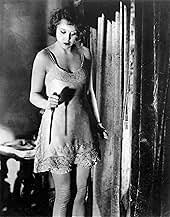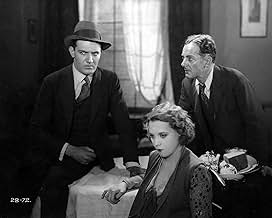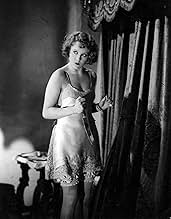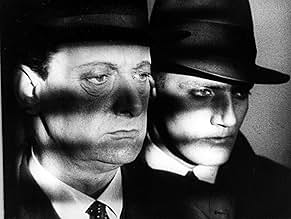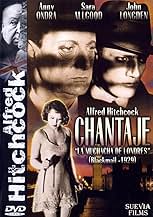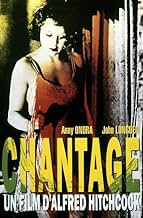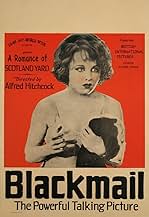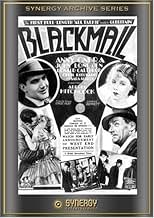CALIFICACIÓN DE IMDb
6.9/10
13 k
TU CALIFICACIÓN
Una mujer mata a un hombre en defensa propia, dando oportunidad al único testigo a que la chantajee.Una mujer mata a un hombre en defensa propia, dando oportunidad al único testigo a que la chantajee.Una mujer mata a un hombre en defensa propia, dando oportunidad al único testigo a que la chantajee.
- Dirección
- Guionistas
- Elenco
- Premios
- 2 premios ganados en total
Ex-Det. Sergt. Bishop
- The Detective Sergeant
- (as Ex-Det. Sergt. Bishop - Late C.I.D. Scotland Yard)
Johnny Ashby
- Boy
- (sin créditos)
Joan Barry
- Alice White
- (voz)
- (sin créditos)
Johnny Butt
- Sergeant
- (sin créditos)
Alfred Hitchcock
- Man on Subway
- (sin créditos)
Phyllis Konstam
- Gossiping Neighbour
- (sin créditos)
Sam Livesey
- The Chief Inspector (silent version)
- (sin créditos)
Phyllis Monkman
- Gossip Woman
- (sin créditos)
Percy Parsons
- Crook
- (sin créditos)
Opiniones destacadas
While remembered as the first sound picture made by Alfred Hitchcock (or anyone else in Britain), there is much more to "Blackmail" than merely historical interest. It reveals the director's subtle creativity, with a carefully structured story that also produces some real suspense, with one of Hitchcock's best cameos and an entertaining chase sequence as bonuses. The movie has a unique feel, as Hitchcock was still using many silent film techniques at the same time that he was experimenting with sound. Not all of this works perfectly, but it does not detract from the film's many positive features.
Alice White (Anny Ondra, voice dubbed by Joan Barry) goes out for the evening with her boyfriend, who is a police detective (John Longden). When they have a series of minor quarrels, Alice decides to go her own way, and meets an artist friend. The artist's intentions are obvious, but Alice is innocently unaware. When he brings her to his studio, there is soon an unpleasant confrontation that sets in motion a turbulent series of events.
The story is carefully constructed not just to produce suspense but also to raise interesting questions in the viewer's mind. Alice feels a terrible sense of guilt and fear over what has happened - communicated to the viewer in a variety of creative ways - but of what is she really guilty? The behavior of the detective boyfriend is partly well-intentioned, but he certainly is not faultless. The moral ambiguity is often subtle, because it takes a back seat to the suspense, and it takes a couple of viewings to appreciate all that is going on.
There is a particularly nice symmetry to the beginning and ending, pointing to the greater significance of the action in between. The opening sequence (filmed in silent movie style) shows the detective and his partner dealing with a suspect in a routine way, not caring about him as a person. In the final scenes, when the detective must help Alice make a final report on everything that has happened, he sees his job in a far different perspective.
"Blackmail" is of the darker type of Hitchcock, like "Notorious" or "Vertigo". While clearly made in a different era, it has the same kind of depth and craftsmanship that distinguished those later, more well-known masterpieces.
Alice White (Anny Ondra, voice dubbed by Joan Barry) goes out for the evening with her boyfriend, who is a police detective (John Longden). When they have a series of minor quarrels, Alice decides to go her own way, and meets an artist friend. The artist's intentions are obvious, but Alice is innocently unaware. When he brings her to his studio, there is soon an unpleasant confrontation that sets in motion a turbulent series of events.
The story is carefully constructed not just to produce suspense but also to raise interesting questions in the viewer's mind. Alice feels a terrible sense of guilt and fear over what has happened - communicated to the viewer in a variety of creative ways - but of what is she really guilty? The behavior of the detective boyfriend is partly well-intentioned, but he certainly is not faultless. The moral ambiguity is often subtle, because it takes a back seat to the suspense, and it takes a couple of viewings to appreciate all that is going on.
There is a particularly nice symmetry to the beginning and ending, pointing to the greater significance of the action in between. The opening sequence (filmed in silent movie style) shows the detective and his partner dealing with a suspect in a routine way, not caring about him as a person. In the final scenes, when the detective must help Alice make a final report on everything that has happened, he sees his job in a far different perspective.
"Blackmail" is of the darker type of Hitchcock, like "Notorious" or "Vertigo". While clearly made in a different era, it has the same kind of depth and craftsmanship that distinguished those later, more well-known masterpieces.
A nice thriller with typical Hitch themes that remains famous thanks to a messy , complex story of attempted rape , killing in self-defense , blackmail , pursuit to death and look for Alfred's screen cameo . It is set in London , later a bitter discussion among lovers , the beautiful vendor Alice White (Amy Ondra , voice by Joan Barry) , sneaks away from her boyfriend and good-looking, efficient and impersonal Scotland Yard police , Frank Webber (John Longden) , to go out on an ill-advised date with the sleazy artist , Mr Crewe (Cyril Ritchard) . However, as the naive girl is lured into Crewe's studio, his sinister sexual advances will soon arm Alice's hand with a serrated bread knife, and before she knows it, the man lies dead in a pool of blood. As the saleswoman Alice getaways the scene of the crime in a numb haze , while the news of the unknown killer is spreading like wildfire all the way up to fiancé Frank's ears . Then Frank elides into a messy , personal story full of turns and while he attempts to keep his girlfriend from being involved .
An early talkie with script by Charles Bennett and Hitchcock himself , as usual , including a lot of sequences that remain genuinely amazing and striking . The dark atmosphere reeks with the feeling something nasty is going to happen any second . Britain's first period directed by Hitchcock who makes his ordinary small appearance on a tube train . It follows the police investigation of a murder with several twists and turns , while an invisible eyewitness will become a ruthless blackmailer . One of the first and best Alfred film to explore the ideas and themes that would become his trademarks , including climatic and memorable scenes . Future successful filmmakers Michael Powell and Ronald Neame were stills cameraman and clapper boy respectively .
The motion picture was well realized by Alfred Hitchcock , his first sound film for Great Britain . Being made as a silent movie , this was an early talkie , and still stunningly hypnotic to see today . In fact , being , nowadays ,more stimulating for its innovations in that area , and by experimenting with a peculiar narrative structure . This fine early effort by Hitch has several novelties , as the movie transcends the limitation of its mystery plot by dealing with thought-provoking issues and focusing on the theatrical meditations of reality . Here Alfred gives signs to be an expertise at tightening tension was already building up . The film belongs to Hitch's first British period when he directed silent films such as ¨The lodger¨ (1926) , ¨The ring¨(1927) , ¨Easy virtue¨ (1927) , ¨The Manxman¨(29) ; being ¨Blackmail¨(29) made as a silent , this was reworked to become a talkie . Following sound movies and early talkies as ¨Murder¨(1930 , ¨June and the Paycock¨(30) , ¨Skin Game¨(31) , ¨Rich and strange¨(32) , ¨Number 17¨(32) , ¨The man who knew too much¨(34) , ¨The 39 steps¨ (35) , ¨The secret agent¨(36) , ¨Sabotage¨(36) , ¨The lady vanishes¨(38) , ¨Jamaica Inn¨ (39) until he is hired by David O'Selznick to shoot¨Rebecca¨(40) in the US .
An early talkie with script by Charles Bennett and Hitchcock himself , as usual , including a lot of sequences that remain genuinely amazing and striking . The dark atmosphere reeks with the feeling something nasty is going to happen any second . Britain's first period directed by Hitchcock who makes his ordinary small appearance on a tube train . It follows the police investigation of a murder with several twists and turns , while an invisible eyewitness will become a ruthless blackmailer . One of the first and best Alfred film to explore the ideas and themes that would become his trademarks , including climatic and memorable scenes . Future successful filmmakers Michael Powell and Ronald Neame were stills cameraman and clapper boy respectively .
The motion picture was well realized by Alfred Hitchcock , his first sound film for Great Britain . Being made as a silent movie , this was an early talkie , and still stunningly hypnotic to see today . In fact , being , nowadays ,more stimulating for its innovations in that area , and by experimenting with a peculiar narrative structure . This fine early effort by Hitch has several novelties , as the movie transcends the limitation of its mystery plot by dealing with thought-provoking issues and focusing on the theatrical meditations of reality . Here Alfred gives signs to be an expertise at tightening tension was already building up . The film belongs to Hitch's first British period when he directed silent films such as ¨The lodger¨ (1926) , ¨The ring¨(1927) , ¨Easy virtue¨ (1927) , ¨The Manxman¨(29) ; being ¨Blackmail¨(29) made as a silent , this was reworked to become a talkie . Following sound movies and early talkies as ¨Murder¨(1930 , ¨June and the Paycock¨(30) , ¨Skin Game¨(31) , ¨Rich and strange¨(32) , ¨Number 17¨(32) , ¨The man who knew too much¨(34) , ¨The 39 steps¨ (35) , ¨The secret agent¨(36) , ¨Sabotage¨(36) , ¨The lady vanishes¨(38) , ¨Jamaica Inn¨ (39) until he is hired by David O'Selznick to shoot¨Rebecca¨(40) in the US .
I have seen most of Alfred Hitchcock's films, silent and talking, and was saving this one for a special occasion. It was really quite good and although over-rated despite being cited so often (along with Mamoulian's "Applause") as a successful example of the transition between the silents and talkies in all the references I've consulted, it still has some distinct good qualities of its own. Annie Ondra is an excellent silent actress and this among several other films proves it. Her accent was very strong, of course, and employing Joan Barry to "lip-synch" was genial. Francois Truffaut's interviews with Hitchcock about working with Ms Ondra were enough to stimulate anyone's appetite to see her (and to hear Joan Barry) at work. The music - at least in the beginning - is excessively burdensome and "busy" and frankly irritating. However, when the characters finally began dialogue, it calmed down considerably and actually worked out well until the ending. We're seeing a hybrid here: a talkie and a part-talkie. When the talking itself finally happens, the characters aren't even facing the camera but are photographed from behind! This is the famous Hitchcock we know and love in the heat of action. The view of the staircase is very Hitchockian as in "Vertigo" or "Psycho" as well as the chase in a public monument (North by Northwest" comes to mind). Yes, the director made the move to talking pictures quite fluently and fluidly. One should keep in mind, too, that the film had already been completed as a silent before being converted into a talkie! All the more to admire...
Curtis Stotlar
Curtis Stotlar
A common motif in Alfred Hitchcock's movies is the guilty woman: "Blackmail", "Psycho" and "The Birds" are all prime examples. In "Blackmail", Alice White (Anny Ondra) goes home with an artist one night and he tries to rape her. She murders him, and from then on everything reminds her of it. The jester painting appears to be looking at her (or she at it?), a billboard looks like a knife, and a woman keeps uttering the word knife. But in the end, everything blows up in Alice's face.
Hitch was certainly showing his chops here. The camera angles, scenery, and other such things all combined to make what we would expect in a Hitchcock movie. I try to imagine being a moviegoer in 1929 watching "Blackmail" for the first time, wondering what Hitchcock's subsequent work would be like.
Hitch was certainly showing his chops here. The camera angles, scenery, and other such things all combined to make what we would expect in a Hitchcock movie. I try to imagine being a moviegoer in 1929 watching "Blackmail" for the first time, wondering what Hitchcock's subsequent work would be like.
Alfred Hitchcock's first talkie is an intriguing film, not entirely successful but still more enjoyable than some of the other films Hitch made around this time. The story starts with a woman cheating on her boyfriend, a Scotland Yard detective. When the man she's with tries to rape her, she kills him in self-defense. Afterwards a criminal who pieces it together blackmails her and her detective boyfriend.
A little creaky but that's to be expected under the circumstances. The film started out being made as a silent before it was decided to turn it into a sound picture. In spots it reverts back to a silent (without intertitles). This actually works in the film's favor. There are some really nicely done lengthy sequences with no dialogue, such as her walk home after she's killed the guy, punctuated by a scream. Good acting all around. Nice direction from Hitch. The museum climax is excellent; an early example of the defining set pieces that would become a Hitchcock trademark. Definitely worth a look if you're a fan. Or even if you're not, provided you enjoy pictures from this period. Not everyone does, unfortunately.
A little creaky but that's to be expected under the circumstances. The film started out being made as a silent before it was decided to turn it into a sound picture. In spots it reverts back to a silent (without intertitles). This actually works in the film's favor. There are some really nicely done lengthy sequences with no dialogue, such as her walk home after she's killed the guy, punctuated by a scream. Good acting all around. Nice direction from Hitch. The museum climax is excellent; an early example of the defining set pieces that would become a Hitchcock trademark. Definitely worth a look if you're a fan. Or even if you're not, provided you enjoy pictures from this period. Not everyone does, unfortunately.
¿Sabías que…?
- TriviaMuch of the filming originally was shot silently. When sound became available during the course of shooting, Sir Alfred Hitchcock reshot certain scenes with sound, thus making it his first talkie. There was one complication with this change, however. Leading lady Anny Ondra had a thick Czech accent which was inappropriate for her character, Alice White. Joan Barry was chosen to provide a different voice for her, but post-production dubbing technology did not exist then. The solution was for Barry to stand just out of shot and read Alice's lines into a microphone as Ondra mouthed them in front of the camera. [This is a major plot point of Cantando bajo la lluvia (1952), which is set in the era of movie studios moving from silent pictures to talkies.] This generally is acknowledged as the first instance of one actress' voice being dubbed by another, even though the word "dub" is technologically inappropriate in this case.
- ErroresAt about 0:24:30 when Crewe (Cyril Ritchard) is talking to Alice (Anny Ondra), he calls her "Anny" before correcting himself.
- Citas
Alice White: You and your Scotland Yard! If it weren't for Edgar Wallace, no one would ever have heard of it.
- Versiones alternativasOriginally filmed as a silent movie, running 75 minutes; Hitchcock later added newly shot scenes and had other existing footage dubbed to create a talkie version, running 86 minutes.
- ConexionesEdited into Der Zinker (1931)
- Bandas sonorasMiss Up-to-Date
(1929) (uncredited)
Words by Frank Eyton and music by Billy Mayerl
Performed by Cyril Ritchard
Selecciones populares
Inicia sesión para calificar y agrega a la lista de videos para obtener recomendaciones personalizadas
Detalles
Taquilla
- Total a nivel mundial
- USD 160
- Tiempo de ejecución1 hora 25 minutos
- Color
- Relación de aspecto
- 1.20 : 1
Contribuir a esta página
Sugiere una edición o agrega el contenido que falta

Principales brechas de datos
By what name was Blackmail (1929) officially released in India in English?
Responda
